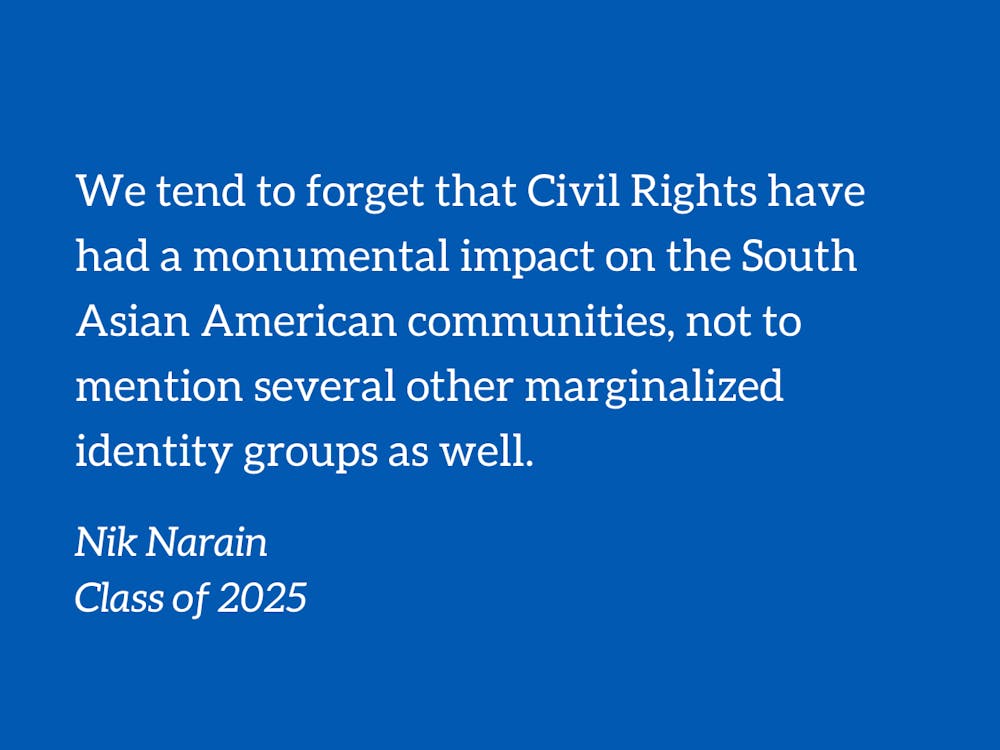It’s Black History Month, as every non-Black person might have reminded you. And as a politically-sensitive, self-obsessed Gen Z kid, there’s only one question I have to ask: how does this affect me?
I’m the daughter of Indian immigrants who came to the U.S. in the early '90s. It was meant to be a temporary gig, but one thing led to another and many jobs and two kids later, they’re still here. With a Prius, even. Nearly 5.4 million South Asian Americans live in the U.S., and the number is obviously much larger for Asian Americans as a whole. Although South Asians have lived in the U.S. since the 1700s, for the majority of us, our stories only began after the passing of the Immigration and Nationality Act of 1965, which abolished a race-based immigration quota.
The Immigration and Nationality Act was enacted in large part due to the Civil Rights Act of 1964 and the Voting Rights Act of 1965. The idea of America being a white-only nation was becoming increasingly unacceptable, and once it became against the law to discriminate on the basis of race, color, religion, sex, or national origin, the same framework was applied to immigration just months later. So the pressure from the Civil Rights Movement led to the massive immigration reform that created South Asian America and, as a result, stories like mine, and maybe even our campus’ obsession with chai lattes.
This information not only challenges the histories we’re taught (or more frequently not taught) in school, but it also challenges the pervasive “model minority myth” within the Asian American community. For South Asians at least, the first wave of immigration post-1965 consisted mainly of well-educated, upper-class individuals who came to the U.S. as students. With the Civil Rights and Voting Rights acts already instituted, we didn’t have to face Jim Crow laws or the refusal of basic civil liberties. We took advantage of the subsidized and sometimes “free” university education. By 1967, with the ending of all bans on interracial marriage following Loving v. Virginia, we could connect with communities outside our own. And we quickly realize that the idea that we “lifted ourselves by the bootstraps” to our success through a strong work ethic, without the help of government programs and political reforms, is just inaccurate.
When we talk about Civil Rights, we tend to celebrate the impact of Black activism in uplifting the Black community. But we tend to forget that Civil Rights have had a monumental impact on the South Asian American communities, not to mention several other marginalized identity groups as well. South Asians and African Americans have been fighting for each other for decades, whether it was MLK’s nonviolent tactics inspired by Gandhi, the Dalit Panthers in India inspired by the Black Panthers, the South Asian freedom fighters who were jailed for violating Jim Crow, or the many South Asians who are speaking out about Black Lives now. If you are interested in learning more about South Asian and African American history, I highly recommend checking out Anirvan Chatterjee’s work in “The Secret History of South Asian and African American Solidarity," whose research and storytelling comprise much of the information in this piece. Perhaps, then, this “Black Desi Secret History” won’t have to remain a secret.
Nik Narain is a Trinity sophomore. His columns typically run on alternate Fridays.
Get The Chronicle straight to your inbox
Sign up for our weekly newsletter. Cancel at any time.

